8A Unit1 friends Grammar
文档属性
| 名称 | 8A Unit1 friends Grammar |  | |
| 格式 | zip | ||
| 文件大小 | 878.7KB | ||
| 资源类型 | 教案 | ||
| 版本资源 | 牛津译林版 | ||
| 科目 | 英语 | ||
| 更新时间 | 2014-12-02 23:02:46 | ||
图片预览

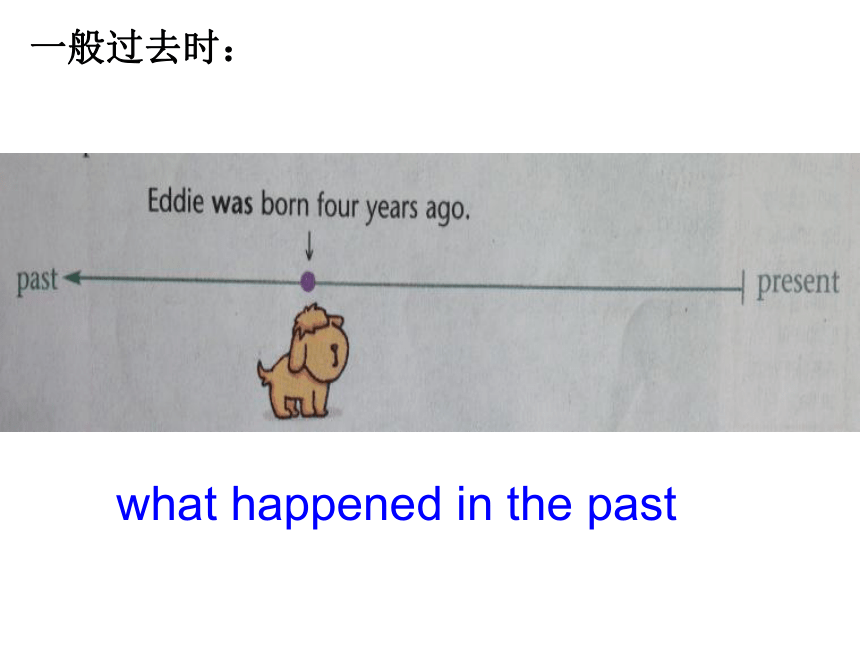
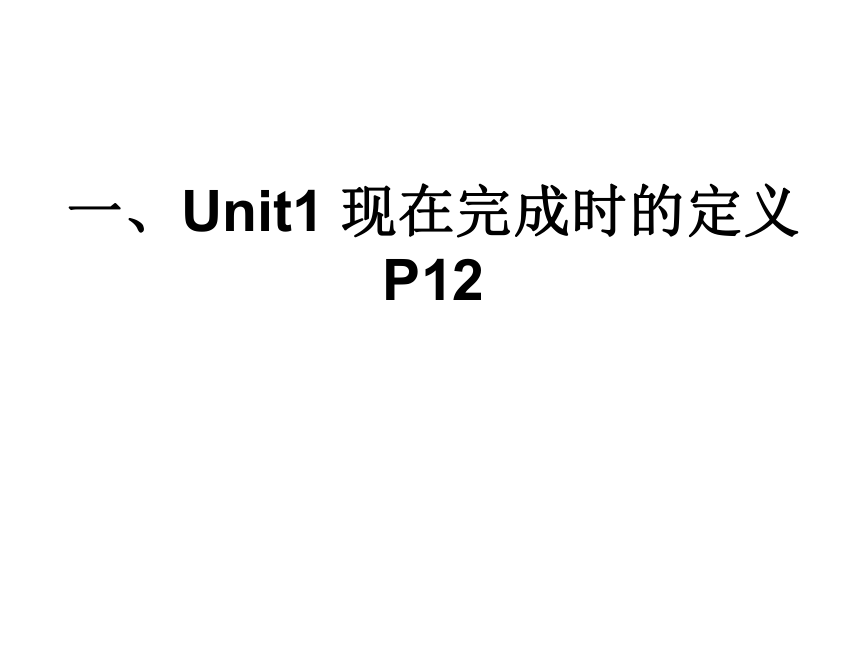
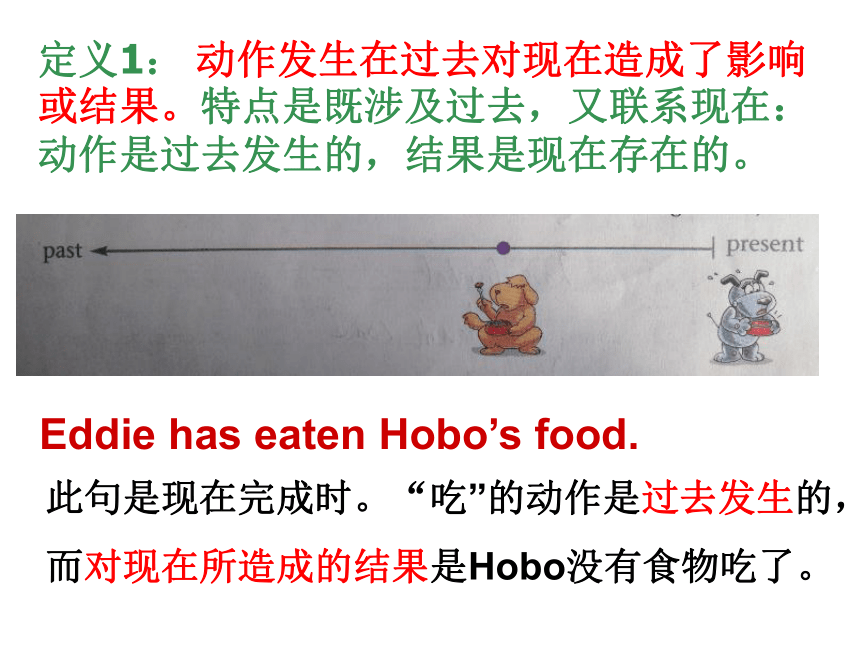

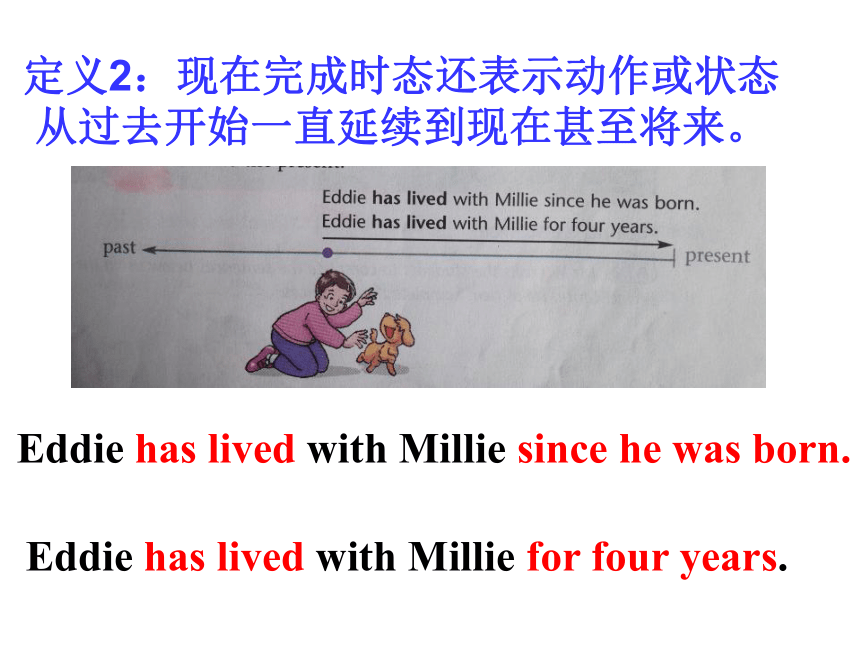
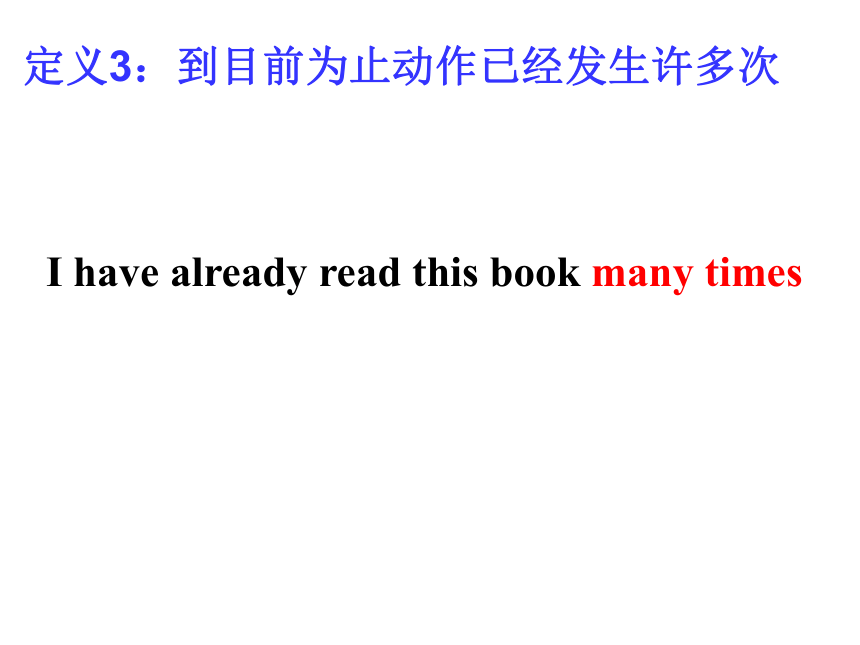
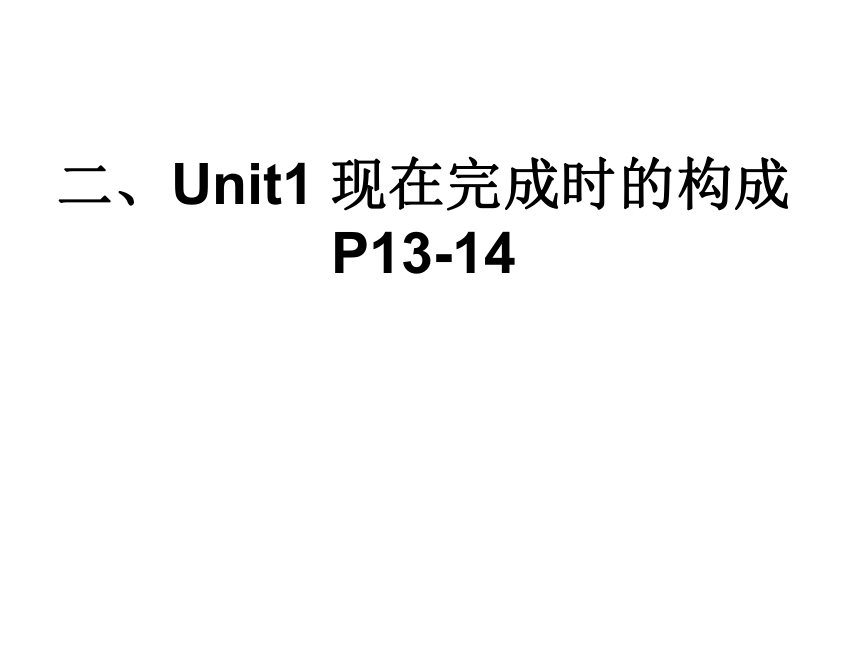
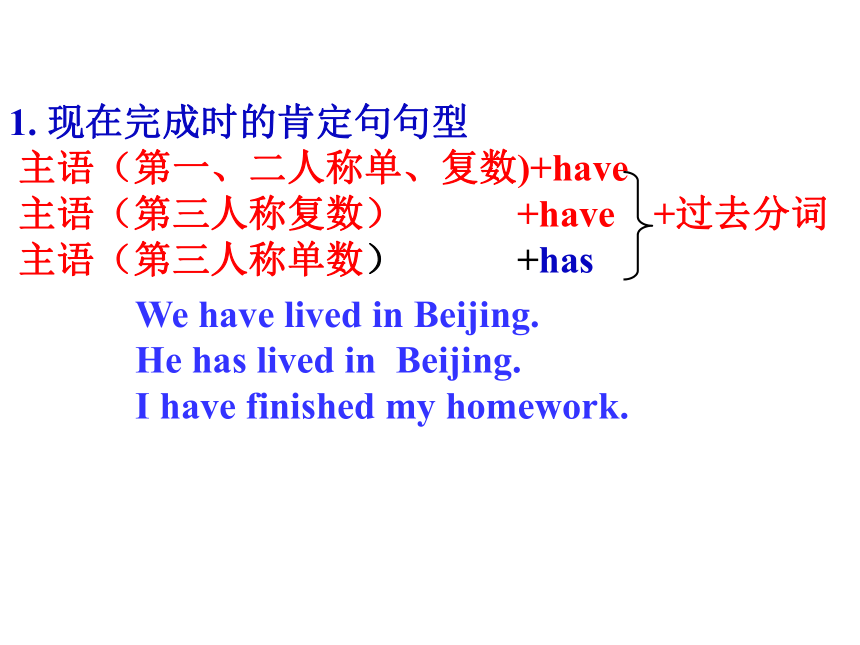
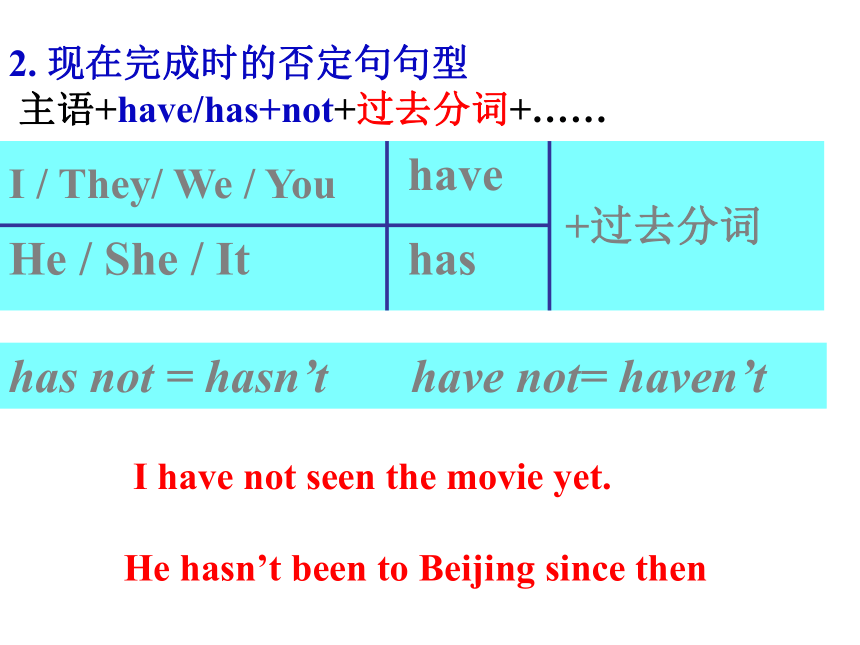
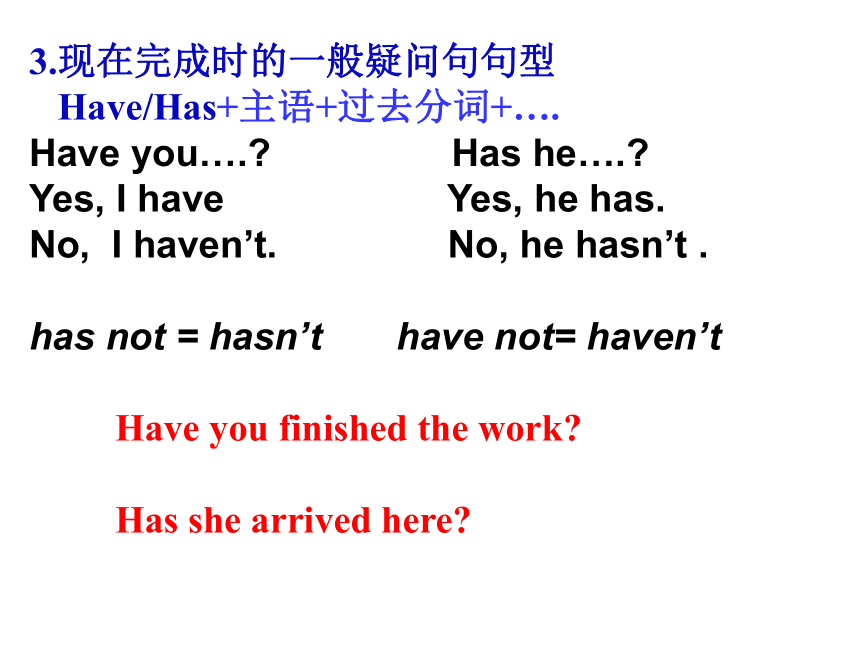
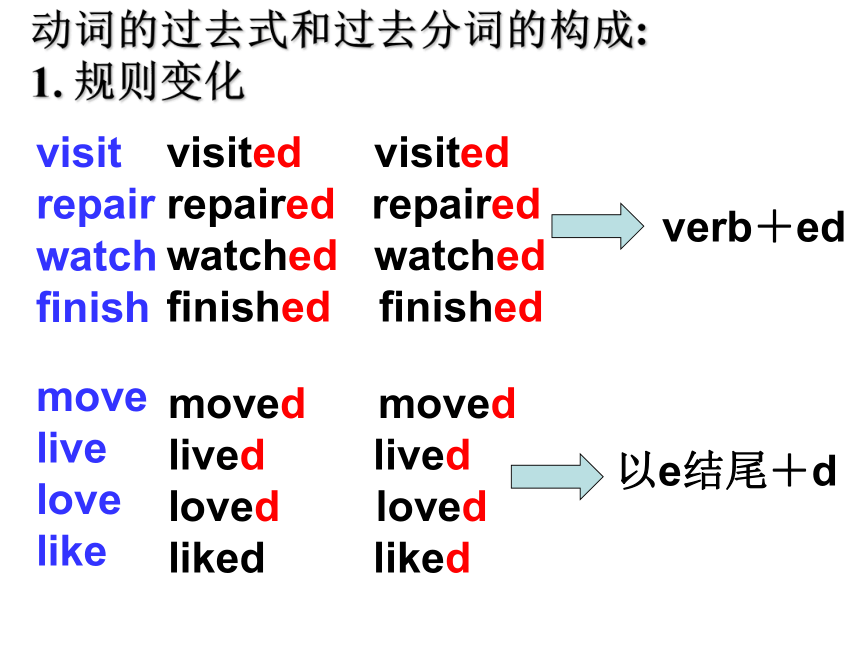
文档简介
课件47张PPT。Present perfect tense一般过去时:what happened in the past一、Unit1 现在完成时的定义
P12定义1: 动作发生在过去对现在造成了影响或结果。特点是既涉及过去,又联系现在:动作是过去发生的,结果是现在存在的。 Eddie has eaten Hobo’s food. 此句是现在完成时。“吃”的动作是过去发生的,
而对现在所造成的结果是Hobo没有食物吃了。He speaks French so fluently. He learned it in Paris. He was there for two years. He has studied French.
(他学过法语。) 这句话所说明的结果是他现在懂法语。Look! The blackboard is so clean now. He has cleaned the blackboard.
(他已经擦过黑板了。)? 这句话所表示的结果是黑板现在是干净的。定义2:现在完成时态还表示动作或状态从过去开始一直延续到现在甚至将来。Eddie has lived with Millie since he was born.Eddie has lived with Millie for four years.定义3:到目前为止动作已经发生许多次I have already read this book many times二、Unit1 现在完成时的构成 P13-14 1. 现在完成时的肯定句句型 主语(第一、二人称单、复数)+have 主语(第三人称复数) +have +过去分词 主语(第三人称单数) +has We have lived in Beijing.
He has lived in Beijing.
I have finished my homework.2. 现在完成时的否定句句型
主语+have/has+not+过去分词+……
I have not seen the movie yet.
He hasn’t been to Beijing since then3.现在完成时的一般疑问句句型
Have/Has+主语+过去分词+….
Have you….? Has he….?
Yes, I have Yes, he has.
No, I haven’t. No, he hasn’t .
has not = hasn’t have not= haven’t
Have you finished the work?
Has she arrived here?move
live
love
like动词的过去式和过去分词的构成: 1. 规则变化visit
repair
watch
finishvisited visited
repaired repaired
watched watched
finished finishedmoved moved
lived lived
loved loved
liked liked verb+ed以e结尾+dstop
mop
trap
planstopped stopped
mopped mopped
trapped trapped
planned planned注:以一个辅音字母结尾的重读闭音节词,双写最后一个辅音字母+ed双写+edstudy
hurrystudied studied
hurried hurried去y+ied注:以辅音字母加y结尾的词,去y+ied.不规则变化P122-123Exercise 1:
bring
buy
fall
feel
speak
think
writebrought brought
bought bought
fell fallen
felt felt
spoke spoken
thought thought
wrote written三、现在完成时的标志词
P10, P40 TIPS1. already已经(用于肯定陈述句)
I have already done the homework.
2. yet还没already的否定式(否定句或疑问句)
I haven’t done the homework yet.
3. just刚刚(位于谓语动词前)
I have just seen Daniel.
4. ever曾经(多用于疑问句,问初次经历),
Have you ever watched the film?
5. never从不(多用于否定陈述句)
I have never read this book.
6. recently 最近 Have you been here recently?标志词1:Making sentences:
They___________(go) to the cinema already.
Mr. And Mrs.Li _________________(not come) back yet.
John___________ (be)to the USA a few times.
We _______________ (not see)that film yet
I _______________ (not talk)to my cousin since last Friday.
_______ you __________ (visit)him for a long time?have gonehaven’t comehas beenhaven’t seenhaven’t talkedHave visitedExercise 2:1.I __________ (do) my homework already.
2.He _______________(not finished) his homework yet.
3.____you ever _____(be) to Beijing?
4.We ______ never ______ (see) such an exciting match before.
5.Mother _____ just _______(clean) the house. Please don’t come in.
6.They _________________(practice) this dialogue twice.have donehas not finishedHavebeenhaveseenhascleanedhave practiced注意:当在肯定陈述句中含有already或just 时,在转换成否定句或疑问句时,要把句中的already 或just 去掉,在句末加上yet. I haven’t seen the film yet.2 I have done my homework already.I haven’t done my homework yet.3. Mother has just cleaned the house.Mother hasn’t cleaned the house yet.1 I have seen the film already. 标志词2: for +一段时间,
since+过去的时间点,
these years, so far, up to now/till now(直到现在)
over the past three years(在过去/最近几年、三年里)
several times(几次)1.We __________ (learn) English for three years/ since two years ago/since 2009.
2.Mr. Green _________ (be) in China these years.
3.They ____________(write) 15 songs so far.
4.The population ____________ (grow) more slowly in the past ten years.have learnedhas beenhave writtenhas grownExercise 3:实力测验 用括号中动词的适当形式填空
He ___ (wait) for an hour.
I (not finish) the work yet.
you (know) him since then?
I ________ (hear) from my father recently.
We ____ (be) there many times in the past 3 years.
They _____ (finish)the work so far.
How long you ____(stay) at home already?
I ________ (not read) the book before.
He just (do) it.
My sister ____ (walk) to school every day last year.
We ____ (have) an exam again sometime next week.
12.Lucy _____ ___(go) to Shanghai. She __ (leave)
this morning. has waitedhaven’t finishedHaveknownhave heardhave beenhave finishedhavestayedhaven’t readhasdonewalkedwill havehas goneleft四、Unit2 B P27-28
Verbs with for and sinceAttention: since的用法1. Since+ 过去某个时间(此时 since充当介词)
Eg: He has been in this school since 2000.
2. Since+一段时间+ ago (此时 since充当介词)
Eg: She has known Susan since seven years ago.
3. Since+ 从句 (此时 since充当连词)(此时主句使用完成时,从句则要使用过去时)
Eg: I have lived here since I was born.
4.当主句的谓语动词为be或seem时,则主句要采用一般现在时,从句仍使用过去时。
Eg: It’s a long time since we left school. Kate has lived here for 3 years.E.g.
Kate has lived here since 3 years ago.
Kate has lived here since she came to China.
for or since1. We have lived here ____ 1990.
2. How long have you studied here ? ___ 5 years .
3. The boy has had a bad cold _____ last night .
4. Mr. Huang has kept the books ______ a week ago .
5.I have taught in the school _____ I came here .
6We have been friends ____ a long time .
for+一段时间
since+时间点
since+句子(一般过去时)sinceForsincesincesinceforExercise 4:非延续性动词在现在完成时中的用法有一些动词是瞬间动词,也叫非延续性动词,这些动词的动作一发生就结束了。这些动词可用于现在完成时,但不能跟表示一段时间的状语连用。如果句子中有表示一段时间的状语,需将非延续性动词改为延续性动词。1 He has become a doctor.他已经成为一名医生
He has been a doctor for five years.他当医生已经五年了。
2 His grandfather has died.他爷爷已去世了。
His grandfather has been dead for ten years.他爷爷已经去世10年了。
3 The film has begun.电影已经开始了。
The film has been on for five minutes.电影已经开始5分钟了。
★切记有些动词是非延续的,在此用法中要换成其相对应的延续性动词:arrive→?????????????????? begin(start)→
die →???????????????????? come back→
leave →???????????
fall ill(sick, asleep)→
open →??????????? ?close →??????
join →
?borrow →??????? buy?→???????????
?finish/end →
get/come to → ?????????????
get married → ???????????????be in/on/atbe onbe deadbe backbe away (from)be ill(sick, asleep)be openbe closedbe in/ be a member of…keephave?be over be in/on/at???be married?1)I _____this book for two weeks, I have to return it now.
A. borrowed B. have borrowed C. kept D. have kept
2)The Greens _____many places of interest since they came to China.
A. will visit B. visited C. have visited D. visit
3)My parents ______ Shandong for ten years.
A. have been in B. have been to
C. have gone to D. have been
4)I'm sorry, I ____ your name.
A. had forgotten B. forgot C. have forgotten D. forgotten
5)Her brother _____the Party since 1978.
A. joined B. has joined C. has been in D. was in
Exercise 5:1.选择题:
2. 用所给动词的适当形式填空:
⑴He (buy) his bike for over two years.
⑵She (borrow) this book for nearly three weeks.
⑶Kitty (arrive) in Hong Kong since two days ago.
⑷She (leave) her home for a month.
⑸Simon (join) the football club since last year.
⑹He (die) for some time.
⑺They (get) married for more than ten years.
⑻My cousin (come) in Beijing for a week.
⑼The parade (begin) for almost an hour.
⑽The conference (stop) since last Sunday.has hadhas kepthas beenhas been away fromhas been inhas been deadhave been marriedhas beenhas been onhas been over慧眼识错1)I have borrowed the book for 3 months.
2)My bother has joined the army since he was 18.
3)Jack and Tom have lived here since 5years.
4)The film has been on since I have come to the cinema.
5)When has Mr. Li caught a bad cold?
have kepthas been in/ been a member of the armysince 5 years ago/ for 5 yearscame didcatch3.改错题:6. Ten years have passed since they got married.
7. Jim has gone to Beijing for 2 years.
8.What time have the factory opened?
9.I have gone to Chunhua Middle School twice
hashas been indidopenbeen to10. They have got married for fifteen years.11. The parade has been on an hour ago .12. The sheep has died for quite some time.13. The winter holiday has stopped
since last Saturday.14.Kitty have borrowed this CD for two weeks. 15.She has looked after her son since six monthssince an hour agohas keptforbeenbeen deadbeen over五、Unit2 A P26
Using have/ has been and have/ has gone
have been to 曾经去过某地(已返回)
Someone went to some place and has already
come back
have been in 去某地一段时间
someone stay in some place for some time
have gone to 去了某地 (没有回来)
Someone went to some place and is still there
A BAA BB stay have/has gone to have/has been to have/has been inhave/has gone to:已经去了某地或人还在途中,人还没有返回;
have/has been to:曾经去过某地,现在已经回来了,后面可接表示“次数”的状语;
have/has been in:表示某人“已在某地停留一段时间,现仍在那里”,其后常带表示一段时间的状语。 Conclusion2、三者的常见用法
have been (to) + 地点+次数
have been (in) + 地点 + for/since
have gone (to) + 地点3、共同点
当后跟地点是副词 (home,here,there)时,介词
省略。have/has gone to… have/has been in … have/has been to… 1.A: Where’s Jim, Li Lei?
B: He ______________his school library.
2.The Greens _____________China for three years.
We _____________the Great Wall twice. It’s very beautiful.has gone tohave been inhave been toExercise 6: Translation
她以前曾去过上海。 She has been to Shanghai before. 他在上海10年了。 He has been in Shanghai for ten years. 他去上海了。He has gone to Shanghai.六、Unit3 P40-42
Simple past tense and present perfect tense★现在完成时和一般过去时的区别:现在完成时,强调这一动作产生的结果对现在的影响,与现在有关。 一般过去时,仅仅表示在过去某一时刻曾发生过这一动作,与现在无关。 他已学英语五年了。 He has studied English for five years. 他曾学过五年英语。 He studied English for five years. (说明他还继续学下去) (只说明他过去学过五年英语,但现在不学了。) 一般过去时与现在完成时有一些明显的时间状语: 遇到yesterday, Last year, in May, in+过去某一年,two days ago, just now等就用一般过去时。当有 so far, in the past/ last few days(在过去/最近的几年里),since接过去时间状语或过去时的句子等常用现在完成时。 用所给词的适当形式填空:He ____________(work) in our school for one year.
He ______(come) to our school last year.
They _______________(cook) the supper already.
They ___________ (cook) the supper half an hour ago.has workedcamehave cookedcooked中考链接一.选择填空 1、Uncle Dong is ______from time to time because he misses his old friends.
A. lonely B. alone C. happy D. unkind
2、Mr and Mrs Black ______ back _________.
A. hasn’t come, yet B. haven’t come , yet
C. haven’t , come already D. hasn’t come , already
3、We haven’t seen each other ________.
A. for a long time B. two days ago
C. for two days ago D. a long time ago.
4、It has been in service ________ 1998.
A. in B. at C. or D. since
5、It _______ seven years __________ Hong Kong return to China.
A. was, since B. is, since
C. was, after D. is , after14.------- _______ you _______ the book ______ to the library yet.
------ Yes. I have.
A. Have ,returned,/ B. Have, returned, back
C. Did return ,/ D. Did, return,back
15.He has _______ finished his homework. He’s now ______ a rest.
A. yet, having B. just, has
C. ever, has D. already, having.
而对现在所造成的结果是Hobo没有食物吃了。He speaks French so fluently. He learned it in Paris. He was there for two years. He has studied French.
(他学过法语。) 这句话所说明的结果是他现在懂法语。Look! The blackboard is so clean now. He has cleaned the blackboard.
(他已经擦过黑板了。)? 这句话所表示的结果是黑板现在是干净的。定义2:现在完成时态还表示动作或状态从过去开始一直延续到现在甚至将来。Eddie has lived with Millie since he was born.Eddie has lived with Millie for four years.定义3:到目前为止动作已经发生许多次I have already read this book many times二、Unit1 现在完成时的构成 P13-14 1. 现在完成时的肯定句句型 主语(第一、二人称单、复数)+have 主语(第三人称复数) +have +过去分词 主语(第三人称单数) +has We have lived in Beijing.
He has lived in Beijing.
I have finished my homework.2. 现在完成时的否定句句型
主语+have/has+not+过去分词+……
I have not seen the movie yet.
He hasn’t been to Beijing since then3.现在完成时的一般疑问句句型
Have/Has+主语+过去分词+….
Have you….? Has he….?
Yes, I have Yes, he has.
No, I haven’t. No, he hasn’t .
has not = hasn’t have not= haven’t
Have you finished the work?
Has she arrived here?move
live
love
like动词的过去式和过去分词的构成: 1. 规则变化visit
repair
watch
finishvisited visited
repaired repaired
watched watched
finished finishedmoved moved
lived lived
loved loved
liked liked verb+ed以e结尾+dstop
mop
trap
planstopped stopped
mopped mopped
trapped trapped
planned planned注:以一个辅音字母结尾的重读闭音节词,双写最后一个辅音字母+ed双写+edstudy
hurrystudied studied
hurried hurried去y+ied注:以辅音字母加y结尾的词,去y+ied.不规则变化P122-123Exercise 1:
bring
buy
fall
feel
speak
think
writebrought brought
bought bought
fell fallen
felt felt
spoke spoken
thought thought
wrote written三、现在完成时的标志词
P10, P40 TIPS1. already已经(用于肯定陈述句)
I have already done the homework.
2. yet还没already的否定式(否定句或疑问句)
I haven’t done the homework yet.
3. just刚刚(位于谓语动词前)
I have just seen Daniel.
4. ever曾经(多用于疑问句,问初次经历),
Have you ever watched the film?
5. never从不(多用于否定陈述句)
I have never read this book.
6. recently 最近 Have you been here recently?标志词1:Making sentences:
They___________(go) to the cinema already.
Mr. And Mrs.Li _________________(not come) back yet.
John___________ (be)to the USA a few times.
We _______________ (not see)that film yet
I _______________ (not talk)to my cousin since last Friday.
_______ you __________ (visit)him for a long time?have gonehaven’t comehas beenhaven’t seenhaven’t talkedHave visitedExercise 2:1.I __________ (do) my homework already.
2.He _______________(not finished) his homework yet.
3.____you ever _____(be) to Beijing?
4.We ______ never ______ (see) such an exciting match before.
5.Mother _____ just _______(clean) the house. Please don’t come in.
6.They _________________(practice) this dialogue twice.have donehas not finishedHavebeenhaveseenhascleanedhave practiced注意:当在肯定陈述句中含有already或just 时,在转换成否定句或疑问句时,要把句中的already 或just 去掉,在句末加上yet. I haven’t seen the film yet.2 I have done my homework already.I haven’t done my homework yet.3. Mother has just cleaned the house.Mother hasn’t cleaned the house yet.1 I have seen the film already. 标志词2: for +一段时间,
since+过去的时间点,
these years, so far, up to now/till now(直到现在)
over the past three years(在过去/最近几年、三年里)
several times(几次)1.We __________ (learn) English for three years/ since two years ago/since 2009.
2.Mr. Green _________ (be) in China these years.
3.They ____________(write) 15 songs so far.
4.The population ____________ (grow) more slowly in the past ten years.have learnedhas beenhave writtenhas grownExercise 3:实力测验 用括号中动词的适当形式填空
He ___ (wait) for an hour.
I (not finish) the work yet.
you (know) him since then?
I ________ (hear) from my father recently.
We ____ (be) there many times in the past 3 years.
They _____ (finish)the work so far.
How long you ____(stay) at home already?
I ________ (not read) the book before.
He just (do) it.
My sister ____ (walk) to school every day last year.
We ____ (have) an exam again sometime next week.
12.Lucy _____ ___(go) to Shanghai. She __ (leave)
this morning. has waitedhaven’t finishedHaveknownhave heardhave beenhave finishedhavestayedhaven’t readhasdonewalkedwill havehas goneleft四、Unit2 B P27-28
Verbs with for and sinceAttention: since的用法1. Since+ 过去某个时间(此时 since充当介词)
Eg: He has been in this school since 2000.
2. Since+一段时间+ ago (此时 since充当介词)
Eg: She has known Susan since seven years ago.
3. Since+ 从句 (此时 since充当连词)(此时主句使用完成时,从句则要使用过去时)
Eg: I have lived here since I was born.
4.当主句的谓语动词为be或seem时,则主句要采用一般现在时,从句仍使用过去时。
Eg: It’s a long time since we left school. Kate has lived here for 3 years.E.g.
Kate has lived here since 3 years ago.
Kate has lived here since she came to China.
for or since1. We have lived here ____ 1990.
2. How long have you studied here ? ___ 5 years .
3. The boy has had a bad cold _____ last night .
4. Mr. Huang has kept the books ______ a week ago .
5.I have taught in the school _____ I came here .
6We have been friends ____ a long time .
for+一段时间
since+时间点
since+句子(一般过去时)sinceForsincesincesinceforExercise 4:非延续性动词在现在完成时中的用法有一些动词是瞬间动词,也叫非延续性动词,这些动词的动作一发生就结束了。这些动词可用于现在完成时,但不能跟表示一段时间的状语连用。如果句子中有表示一段时间的状语,需将非延续性动词改为延续性动词。1 He has become a doctor.他已经成为一名医生
He has been a doctor for five years.他当医生已经五年了。
2 His grandfather has died.他爷爷已去世了。
His grandfather has been dead for ten years.他爷爷已经去世10年了。
3 The film has begun.电影已经开始了。
The film has been on for five minutes.电影已经开始5分钟了。
★切记有些动词是非延续的,在此用法中要换成其相对应的延续性动词:arrive→?????????????????? begin(start)→
die →???????????????????? come back→
leave →???????????
fall ill(sick, asleep)→
open →??????????? ?close →??????
join →
?borrow →??????? buy?→???????????
?finish/end →
get/come to → ?????????????
get married → ???????????????be in/on/atbe onbe deadbe backbe away (from)be ill(sick, asleep)be openbe closedbe in/ be a member of…keephave?be over be in/on/at???be married?1)I _____this book for two weeks, I have to return it now.
A. borrowed B. have borrowed C. kept D. have kept
2)The Greens _____many places of interest since they came to China.
A. will visit B. visited C. have visited D. visit
3)My parents ______ Shandong for ten years.
A. have been in B. have been to
C. have gone to D. have been
4)I'm sorry, I ____ your name.
A. had forgotten B. forgot C. have forgotten D. forgotten
5)Her brother _____the Party since 1978.
A. joined B. has joined C. has been in D. was in
Exercise 5:1.选择题:
2. 用所给动词的适当形式填空:
⑴He (buy) his bike for over two years.
⑵She (borrow) this book for nearly three weeks.
⑶Kitty (arrive) in Hong Kong since two days ago.
⑷She (leave) her home for a month.
⑸Simon (join) the football club since last year.
⑹He (die) for some time.
⑺They (get) married for more than ten years.
⑻My cousin (come) in Beijing for a week.
⑼The parade (begin) for almost an hour.
⑽The conference (stop) since last Sunday.has hadhas kepthas beenhas been away fromhas been inhas been deadhave been marriedhas beenhas been onhas been over慧眼识错1)I have borrowed the book for 3 months.
2)My bother has joined the army since he was 18.
3)Jack and Tom have lived here since 5years.
4)The film has been on since I have come to the cinema.
5)When has Mr. Li caught a bad cold?
have kepthas been in/ been a member of the armysince 5 years ago/ for 5 yearscame didcatch3.改错题:6. Ten years have passed since they got married.
7. Jim has gone to Beijing for 2 years.
8.What time have the factory opened?
9.I have gone to Chunhua Middle School twice
hashas been indidopenbeen to10. They have got married for fifteen years.11. The parade has been on an hour ago .12. The sheep has died for quite some time.13. The winter holiday has stopped
since last Saturday.14.Kitty have borrowed this CD for two weeks. 15.She has looked after her son since six monthssince an hour agohas keptforbeenbeen deadbeen over五、Unit2 A P26
Using have/ has been and have/ has gone
have been to 曾经去过某地(已返回)
Someone went to some place and has already
come back
have been in 去某地一段时间
someone stay in some place for some time
have gone to 去了某地 (没有回来)
Someone went to some place and is still there
A BAA BB stay have/has gone to have/has been to have/has been inhave/has gone to:已经去了某地或人还在途中,人还没有返回;
have/has been to:曾经去过某地,现在已经回来了,后面可接表示“次数”的状语;
have/has been in:表示某人“已在某地停留一段时间,现仍在那里”,其后常带表示一段时间的状语。 Conclusion2、三者的常见用法
have been (to) + 地点+次数
have been (in) + 地点 + for/since
have gone (to) + 地点3、共同点
当后跟地点是副词 (home,here,there)时,介词
省略。have/has gone to… have/has been in … have/has been to… 1.A: Where’s Jim, Li Lei?
B: He ______________his school library.
2.The Greens _____________China for three years.
We _____________the Great Wall twice. It’s very beautiful.has gone tohave been inhave been toExercise 6: Translation
她以前曾去过上海。 She has been to Shanghai before. 他在上海10年了。 He has been in Shanghai for ten years. 他去上海了。He has gone to Shanghai.六、Unit3 P40-42
Simple past tense and present perfect tense★现在完成时和一般过去时的区别:现在完成时,强调这一动作产生的结果对现在的影响,与现在有关。 一般过去时,仅仅表示在过去某一时刻曾发生过这一动作,与现在无关。 他已学英语五年了。 He has studied English for five years. 他曾学过五年英语。 He studied English for five years. (说明他还继续学下去) (只说明他过去学过五年英语,但现在不学了。) 一般过去时与现在完成时有一些明显的时间状语: 遇到yesterday, Last year, in May, in+过去某一年,two days ago, just now等就用一般过去时。当有 so far, in the past/ last few days(在过去/最近的几年里),since接过去时间状语或过去时的句子等常用现在完成时。 用所给词的适当形式填空:He ____________(work) in our school for one year.
He ______(come) to our school last year.
They _______________(cook) the supper already.
They ___________ (cook) the supper half an hour ago.has workedcamehave cookedcooked中考链接一.选择填空 1、Uncle Dong is ______from time to time because he misses his old friends.
A. lonely B. alone C. happy D. unkind
2、Mr and Mrs Black ______ back _________.
A. hasn’t come, yet B. haven’t come , yet
C. haven’t , come already D. hasn’t come , already
3、We haven’t seen each other ________.
A. for a long time B. two days ago
C. for two days ago D. a long time ago.
4、It has been in service ________ 1998.
A. in B. at C. or D. since
5、It _______ seven years __________ Hong Kong return to China.
A. was, since B. is, since
C. was, after D. is , after14.------- _______ you _______ the book ______ to the library yet.
------ Yes. I have.
A. Have ,returned,/ B. Have, returned, back
C. Did return ,/ D. Did, return,back
15.He has _______ finished his homework. He’s now ______ a rest.
A. yet, having B. just, has
C. ever, has D. already, having.
